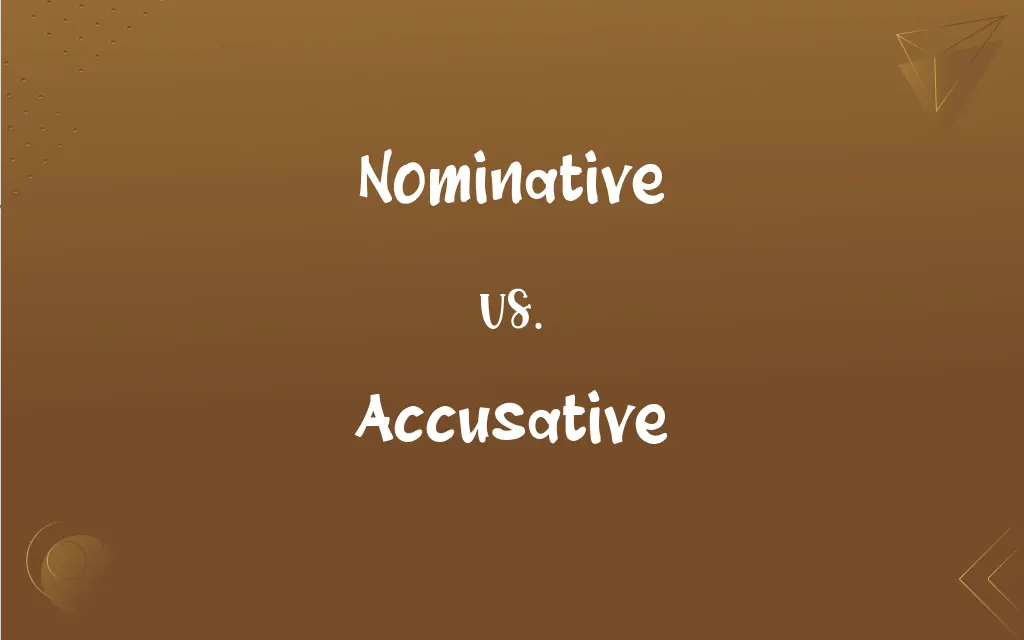Nominative vs. Accusative: What's the Difference?
Edited by Janet White || By Harlon Moss || Published on November 24, 2023
Nominative refers to the subject of a sentence, while accusative refers to the direct object receiving an action.

Key Differences
The nominative case is used for the subject of a verb, indicating who or what is performing the action. On the other hand, the accusative case is used for the direct object, indicating who or what is receiving the action.
When considering grammar, the nominative is the form of a noun or pronoun that shows its relation to the verb as the doer or be-er. The accusative, in contrast, shows its relation as the receiver of the action.
In English, the distinction between nominative and accusative is primarily visible in pronouns. For example, "he" (nominative) vs. "him" (accusative) or "she" (nominative) vs. "her" (accusative).
While nominative typically identifies the main character of the action, accusative identifies the target or goal of that action. These roles are crucial in understanding the structure of many sentences.
Understanding the difference between nominative and accusative can help in constructing sentences more clearly and can also be essential when learning languages that have a more rigorous case system.
ADVERTISEMENT
Comparison Chart
Grammatical Role
Subject of the verb.
Direct object of the verb.
English Example
"She (nominative) likes the movie."
"She likes him (accusative)."
Pronoun Distinction
"I", "he", "she", "we", "they".
"me", "him", "her", "us", "them".
Function
Indicates who or what is performing the action.
Indicates who or what is receiving the action.
Usage in Sentences
Comes before the verb most times.
Often follows the verb or preposition.
ADVERTISEMENT
Nominative and Accusative Definitions
Nominative
The case used for the subject of the verb.
He (nominative) runs fast.
Accusative
The form of a noun or pronoun showing its relation as the receiver of the action.
I called her (accusative) yesterday.
Nominative
The grammatical case that marks typically the subject of a verb or predicate.
They (nominative) were on vacation.
Accusative
The grammatical case indicating the direct object of a verb.
The cat chased the mouse (accusative).
Nominative
A case that signifies the actor or agent in a sentence.
We (nominative) are studying.
Accusative
The case used for the direct object of a verb.
She loves him (accusative).
Nominative
The category of nouns serving as the grammatical subject of a verb.
Dogs (nominative) bark.
Accusative
A case indicating the goal or end point of an action.
She gave the book (accusative) to him.
Nominative
The form of a noun or pronoun showing its relation as the doer or be-er in a sentence.
She (nominative) is a teacher.
Accusative
The category of nouns or pronouns acted upon in a sentence.
He reads the newspaper (accusative) daily.
Nominative
Appointed to office.
Accusative
Of, relating to, or being the grammatical case that is the direct object of a verb or the object of certain prepositions.
Nominative
Nominated as a candidate for office.
Accusative
Accusatory.
Nominative
Having or bearing a person's name
Nominative shares.
FAQs
What is the nominative case?
The nominative case is used for the subject of a verb, indicating who or what is performing the action.
Can you provide an example of an accusative pronoun in English?
Yes, "him," "her," and "them" are examples of accusative pronouns.
How is the accusative different from the dative case?
The accusative indicates the direct object, while the dative usually indicates the indirect object.
Can "I" and "me" be examples of nominative and accusative respectively?
Yes, "I" is nominative, and "me" is accusative.
Where can I typically find the nominative in a sentence?
The nominative usually appears before the verb, representing the doer of the action.
Is the nominative case present in all languages?
No, not all languages have a nominative case, but many Indo-European languages do.
Is the accusative case only about receiving actions?
Primarily, yes. It indicates who or what is acted upon in the sentence.
How does the accusative case function?
The accusative case is used for the direct object, indicating who or what is receiving the action.
Can a sentence have both nominative and accusative forms?
Yes, e.g., "She (nominative) loves him (accusative)."
Are there languages where nouns change form in the nominative and accusative?
Yes, languages like German and Latin exhibit this change.
Is understanding nominative and accusative crucial for English learners?
While English isn't as case-sensitive as some languages, understanding these concepts can aid comprehension and is vital for learning other languages.
Do English nouns change form based on nominative and accusative?
No, English nouns don't change, but some pronouns do, like "he" (nominative) vs. "him" (accusative).
Is the difference between nominative and accusative evident in all English pronouns?
No, only in some. For example, "you" stays the same, but "he" changes to "him."
Is "they" a nominative pronoun?
Yes, "they" is nominative, and its accusative form is "them."
Can a sentence lack an accusative component?
Yes, not all sentences require a direct object (accusative).
Why is it important to understand the difference between nominative and accusative?
It aids in constructing clear sentences in English and is crucial when learning languages with strict case systems.
Can the accusative case follow prepositions?
Yes, in many languages, certain prepositions take the accusative case.
Do the nominative and accusative cases exist in non-Indo-European languages?
Some non-Indo-European languages have them, but the presence and function can vary.
Is the subject of a sentence always in the nominative case?
Generally, yes. The nominative case typically represents the subject.
How can I easily identify the accusative in a sentence?
Look for who or what is directly affected by the verb's action.
About Author
Written by
Harlon MossHarlon is a seasoned quality moderator and accomplished content writer for Difference Wiki. An alumnus of the prestigious University of California, he earned his degree in Computer Science. Leveraging his academic background, Harlon brings a meticulous and informed perspective to his work, ensuring content accuracy and excellence.
Edited by
Janet WhiteJanet White has been an esteemed writer and blogger for Difference Wiki. Holding a Master's degree in Science and Medical Journalism from the prestigious Boston University, she has consistently demonstrated her expertise and passion for her field. When she's not immersed in her work, Janet relishes her time exercising, delving into a good book, and cherishing moments with friends and family.







































































